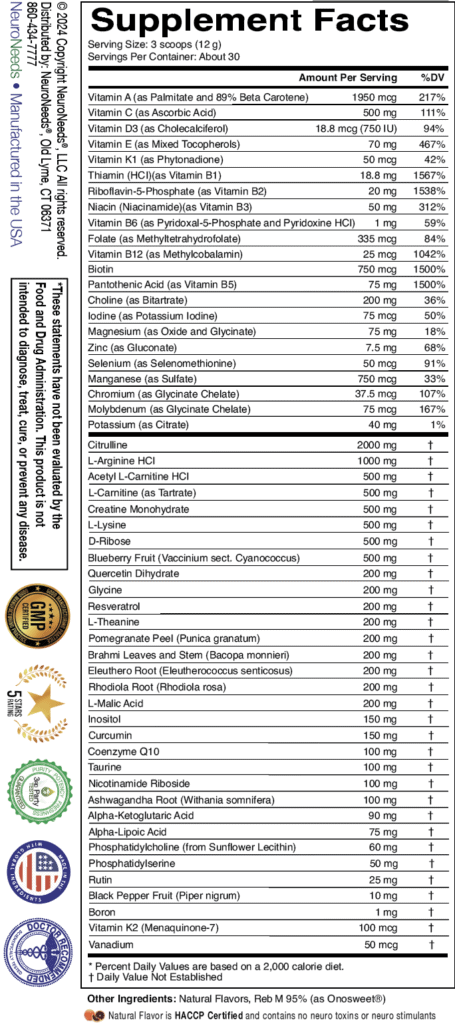$84
Boron
Boron is a trace mineral found in the diet and present in humans. It is part of the plant cell wall and required by plants. Boron may be needed for human health, but studies are inconclusive. At present, boron is not recommended for any disease or condition. However, it may have beneficial effects on reproduction, calcium metabolism, bone formation, brain function, insulin action, energy metabolism, immunity, and the functions of vitamin D and estrogen. Some studies have reported antioxidant effects as well as reductions in inflammation and cancer risks associated with boron. High doses of boron (> 20 mg daily) may have side effects. Side effects are unexpected at the low dose used in ActivNeeds (1 mg).
Boron in ActivNeeds
Boron is present in order to provide a wide basis of nutrition, especially given data suggesting improvements in brain, bone, and hormonal health, its antioxidant effects, and possible reductions in inflammation and cancer risks.
Boron is a trace mineral that is present in many foods and water, and is present in the body. It is found in a variety of plant products where it is a necessary component of their cell wall.
While a required element in plants, boron has not been proven to be an essential mineral for humans. “However, it might have beneficial effects on such functions as reproduction and development, calcium metabolism, bone formation, brain function, insulin and energy substrate metabolism, immunity, and the function of steroid hormones (including vitamin D and estrogen)” (NIH Fact Sheet for Health Professionals; https://ods.od.nih.gov/factsheets/Boron-HealthProfessional). Boron has antioxidant properties, including raising levels of antioxidant enzymes, such as superoxide dismutase, catalase, and glutathione peroxidase, and protecting against pesticide-induced oxidative stress and heavy-metal toxicity [https://www.ncbi.nlm.nih.gov/pmc/articles/PMC4712861]. Boron levels in the blood do not change substantially even with large intake, suggesting the presence of undiscovered mechanisms for homeostasis.
In humans, the signs and symptoms of boron deficiency have not been firmly established. Boron deficiency might impair mental alertness and executive brain function. A low-boron diet might elevate urinary calcium excretion and lower serum concentrations of estrogen in postmenopausal women. Low boron intakes also appear to reduce plasma calcium and serum 25-hydroxyvitamin D levels in men and women, possibly affecting bone mineral density (NIH Fact Sheet for Health Professionals; https://ods.od.nih.gov/factsheets/Boron-HealthProfessional). Areas with high rainfall have lower amounts of boron in plant foods due to washout, and thus deficiency is more likely.
Boron appears to have effects on other minerals such as calcium and magnesium. Boron likely increases estrogen levels after menopause. Boron supplementation lowered inflammatory biomarkers such as CRP in one study [PMID: 21607703, https://pubmed.ncbi.nlm.nih.gov/21607703]. Boron “improves the brains electrical activity, cognitive performance, and short-term memory for elders” [https://www.ncbi.nlm.nih.gov/pmc/articles/PMC4712861]. Some studies have shown that lower cancer risks (e.g., such as prostate, cervical, lung, lymphoma) are associated with higher boron intakes in the diet (NIH Fact Sheet for Health Professionals; https://ods.od.nih.gov/factsheets/Boron-HealthProfessional ; https://www.ncbi.nlm.nih.gov/pmc/articles/PMC4712861). Occasionally, boron is used for menstrual cramps, osteoarthritis, osteoporosis, and many other conditions. It is sometimes used to improve athletic performance, although without good evidence.
Boron is likely safe when used in doses under 20 mg daily. Higher dosing might cause male fertility problems, irritability, tremors, weakness, headaches, diarrhea, and vomiting. Side effects are unlikely in the dosing (1 mg) present in ActivNeeds. For comparison, the estimated adult consumption of boron is 1-1.5 mg daily. No clinically relevant interactions with medications are known for boron (NIH Fact Sheet for Health Professionals; https://ods.od.nih.gov/factsheets/Boron-HealthProfessional). However, because of its potential effects on estrogen, discuss with your physician if you have a hormone-sensitive cancer or other conditions, such as endometriosis. People with kidney failure should also discuss with their physician.
Laboratory testing can test for boron, but is generally not likely to have clinically utility.
How and Why Boron Is Used in
Boron is added to ActivNeeds in order to provide a wide basis of nutrition, especially given the important role of boron in nerve, bone, and hormonal health, its antioxidant effects, as well as possible reductions in inflammation and cancer risks. Side effects are unexpected at the doses used in ActivNeeds.
Order ActivNeeds Today
Formulations










